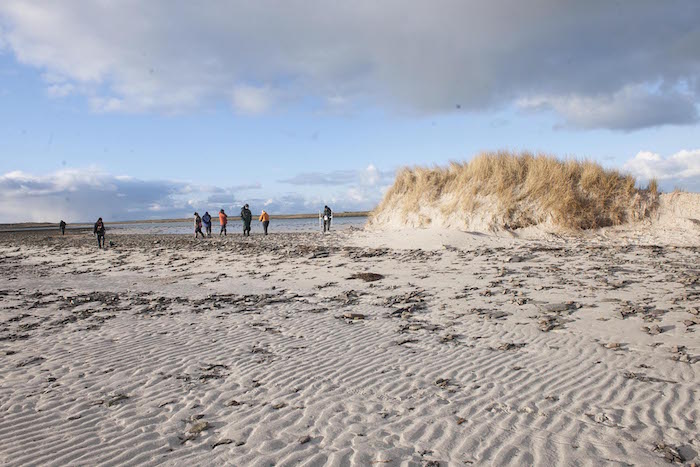Global Research Highlights 2015: IHOPE
More than 20 global research projects have transitioned, or are in the process of transitioning, to Future Earth from three previous global environmental change programmes: the International Geosphere-Biosphere Programme (IGBP), the International Human Dimension Programme on Global Environmental Change (IHDP) and DIVERSITAS. For years and, in many cases, decades, these projects have generated critical research on the planet's land, oceans and atmosphere and its past and current climate and peoples. They will continue to produce valuable knowledge about the globe under Future Earth.
Over the next weeks, Future Earth will publish a series of posts to highlight some of the research and successes that emerged from these projects in the past year. Check back in often to learn about pollution in the Arctic, small-scale fisheries around the globe, worldwide disaster risk and more.
Today, we feature the Integrated History and Future of People on Earth (IHOPE) project.
What’s new for IHOPE?
Evidence of long-term sustainability from Iceland & Faroes
The arrival of humans in previously pristine natural environments does not always result in the ecological devastation that is popularly presented, with Iceland and the Faroe Islands representing a new positive case study. Archaeology, history, biosciences and collaboration with local residents have documented two remarkable millennial-scale cases of successful and genuinely sustainable management of puffin and other sea bird colonies in the Faroe Islands and of migratory waterfowl in the Mývatn Lake basin in Northern Iceland. Despite the potential for conflict between foraging by imported European pigs with the survival of nesting bird colonies, animal bones from archaeological refuse deposits combined with place name evidence indicate careful management, dating from initial settlement in the Viking age down to the present day. Despite their role as high status food, pigs eventually were removed from both island landscapes, and the fragile bird colonies have been preserved.
Local and traditional resource management practices that allowed such sustainable wild resource use over a millennium despite periods of famine, disease, volcanic eruption and abrupt climate change represent an under-used resource for modern managers looking for time-tested tools for coping with environmental change and the management of wild species.

Community members from Orkney work alongside researchers to map middens and stone tools in a Bronze Age village. Photo: UHI Institute of Archaeology/Frank Bradford
IHOPE works with multiple collaborators to promote the use of long term perspectives in fashioning modern adaptive management strategies, the engagement of local communities in the co-production of knowledge of management of land and natural resources and the expanded use of the wide range of scientific information now available from archaeological deposits. The idea that archaeological sites form a “distributed observing network of the past” is gaining recognition among other disciplines, and archaeology is playing a growing role as a global change science.
Unfortunately, just as new analytical approaches (stable isotopes, trace elements, ancient DNA) allow increasing contribution to understanding past environments and human impact, we are rapidly losing archaeological sites to global change impacts (erosion, wildfire, warming soil in the circumpolar north and at high elevations). The IHOPE Threats to Heritage and the Distributed Observing Network of the Past teams are working to share expertise and coordinate an international response. Other IHOPE teams take on different aspects of long term human–environmental interaction with the aim of mobilizing the long record of the past to serve present and future human needs.
What is IHOPE doing next?
We are launching a new sub-global scale for our analysis of past and future peoples that matches with the scales used by climate change and Earth system research scientists. Among our first projects will be a circum-Indian Ocean study of the effects of historic monsoons. IHOPE participants bring together a wide range of regional and global expertise in field work, laboratory research and the increasing use of environmental modeling and digital visualization tools. We continue to expand global coverage of case studies and to recruit colleagues from under-represented regions and continents.
Some of IHOPE's 2015 publications
Brewington, S. et al. (2015) Islands of Change vs. Islands of Disaster: Managing Pigs and Birds in the Anthropocene of the North Atlantic. In: Arlene Rosen (ed.) The Anthropocene in the Longue Durée, special issue of The Holocene 25(10):1676-1684. DOI: 10.1177/0959683615591714
Dearing, J.A., Acma, B., Bub, S., Chambers, F.M., Chen, X., Cooper, J., Crook, D., Dong, X.H., Dotterweich, M., Edwards, M.E., Foster, T.H., Gaillard, M.J., Galop, D., Gell, P., Jones, R.T., Anupama, K., Langdon, P.G., Mazier, F., McLean, C.E., Nunes, L.H., Sukumar, R., Suryaprakash, I., Umer, M., Yang, X.D., Wang, R. and Zhang, K. (2015) Social-ecological systems in the Anthropocene: the need for integrating social and biophysical records at regional scales. The Anthropocene Review 1-27.
Isendahl, Christian and Daryl Stump [editors] (includes many IHOPE authors). 2015 Handbook of Historical Ecology and Applied Archaeology. Oxford: Oxford University Press.
Plieninger, T., T. Kizos, C. Bieling, L. Le Dû-Blayo, M.-A. Budniok, M. Bürgi, C. L. Crumley, G. Girod, P. Howard, J. Kolen, T. Kuemmerle, G. Milcinski, H. Palang, K. Trommler and P. H. Verburg. (2015) Exploring ecosystem-change and society through a landscape lens: recent progress in European landscape research. Ecology and Society 20(2): 5.
Zhang, K., Dearing, J.A., Dawson, T.P., Dong, X., Yang, X. and W. Zhang. (2015) Poverty alleviation strategies in eastern China lead to critical ecological dynamics. Science of the Total Environment 506–507, 164–181.
Further information on IHOPE
Prof. Carole Crumley crumley@unc.edu or Dr. Karl-Johan Lindholm karljohan.lindholm@arkeologi.uu.se
Footnote
Though we have evidence of past sustainable management on these Islands, we add that the Arctic Biodiversity Assessment of 2013 showed that most species of the region are in decline, and ongoing bad reproductive seasons for seabirds is of concern. Eggs also reportedly contain high levels of PCBs and other chemicals.
DATE
June 24, 2016AUTHOR
Future Earth Staff MemberSHARE WITH YOUR NETWORK
RELATED POSTS
Future Earth Taipei Hosts the 2024 Ocean Action Symposium
Call for Abstracts: 2024 Innovate4Cities Conference
Mason University Students Embark on Summer of Research with Future Earth